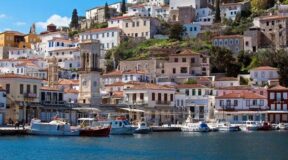Greece is a renowned travel destination, celebrated for its rich history, vibrant culture, stunning landscapes, and beautiful islands. Here’s a comprehensive guide to tourism in Greece:
Major Cities and Historical Sites
- Athens: The capital city, known for its ancient monuments and vibrant modern culture.
- Acropolis and Parthenon: The iconic ancient citadel and temple dedicated to the goddess Athena.
- Acropolis Museum: Houses artifacts found on the Acropolis.
- Ancient Agora: The heart of ancient Athens, where Socrates once walked.
- National Archaeological Museum: One of the world's greatest museums, with a vast collection of Greek antiquities.
- Thessaloniki: Greece’s second-largest city, known for its festivals, vibrant nightlife, and Byzantine history.
- White Tower: The city's most famous landmark, offering panoramic views.
- Rotunda: A massive round building that has served as a mausoleum, church, and mosque.
- Archaeological Museum of Thessaloniki: Contains significant artifacts from Macedonia.
- Delphi: Once considered the center of the world in ancient Greek religion.
- Temple of Apollo: Where the Oracle of Delphi prophesied.
- Delphi Archaeological Museum: Showcases important ancient artifacts.
Greek Islands
- Santorini: Known for its dramatic views, stunning sunsets, and white-washed buildings.
- Fira and Oia: Picturesque towns with breathtaking views of the caldera.
- Red Beach: Famous for its unique red volcanic sand.
- Mykonos: Famous for its lively nightlife, beautiful beaches, and charming town.
- Little Venice: A photogenic neighborhood with vibrant nightlife.
- Windmills: Iconic landmarks overlooking the town and the sea.
- Crete: The largest Greek island, rich in history and diverse landscapes.
- Knossos Palace: The center of the Minoan civilization.
- Samaria Gorge: One of Europe’s longest gorges, ideal for hiking.
- Elafonissi Beach: Known for its pink sand and crystal-clear waters.
- Rhodes: Known for its medieval architecture and beautiful beaches.
- Old Town of Rhodes: A UNESCO World Heritage site with well-preserved medieval structures.
- Lindos Acropolis: Offers stunning views over the sea and surrounding area.
- Corfu: An island with lush landscapes and a mix of cultural influences.
- Corfu Town: A UNESCO World Heritage site with Venetian, French, and British architecture.
- Paleokastritsa Beach: Known for its clear waters and scenic surroundings.
Mainland Attractions
- Meteora: A UNESCO World Heritage site with monasteries perched on top of towering rock formations.
- Peloponnese: A region rich in history and natural beauty.
- Mycenae: An ancient city with significant archaeological remains, including the Lion Gate.
- Epidaurus: Famous for its ancient theater and healing center.
- Olympia: The birthplace of the Olympic Games.
- Mount Olympus: The highest mountain in Greece and the mythical home of the Greek gods. Popular for hiking and climbing.
Cultural Experiences
- Greek Cuisine: Enjoy traditional dishes such as moussaka, souvlaki, tzatziki, and fresh seafood.
- Olive Oil Tasting: Greece is renowned for its high-quality olive oil.
- Wine Tasting: Visit vineyards and taste wines from regions like Santorini and Nemea.
- Festivals: Experience local culture through various festivals.
- Easter Celebrations: Particularly notable in Corfu and other parts of Greece.
- Athens and Epidaurus Festival: Features performances of ancient drama in historic venues.
Beaches and Outdoor Activities
- Beaches: Greece boasts some of the world’s most beautiful beaches.
- Navagio Beach (Zakynthos): Known for its shipwreck and stunning blue waters.
- Myrtos Beach (Kefalonia): Famous for its turquoise waters and white pebble shore.
- Sailing and Yachting: Explore the Greek islands by boat, a popular way to experience the coastline.
- Hiking: Numerous trails across the country, including the E4 European long-distance path.
Practical Tips
- Language: Greek is the official language, but English is widely spoken in tourist areas.
- Currency: The Euro (EUR) is used.
- Transportation: Greece has a well-developed public transport system, including ferries between the islands, buses, and trains on the mainland.
Best Time to Visit
- Summer (June to August): Ideal for beach holidays, but it’s also the peak tourist season.
- Spring (April to June) and Autumn (September to October): Best for sightseeing with pleasant weather and fewer crowds.
- Winter (November to March): Suitable for cultural tourism and experiencing local life, with fewer tourists around.
Greece offers a unique blend of ancient history, vibrant culture, and natural beauty, making it a top destination for travelers of all interests.

